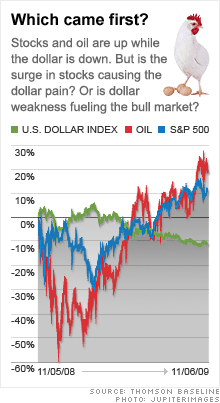The dollar is weak because ...
... stocks and oil are surging. Or is it the other way around? Figuring out the cause and effect could help determine what's next for the economy.


NEW YORK (CNNMoney.com) -- Here's the latest twist on the timeless chicken versus the egg debate. Which came first: the stock and commodities rally or the weaker dollar?
There is no denying that the dollar has lost a fair amount of ground over the past few months while at the same time, stocks, oil and gold have skyrocketed.
But is there a real cause and effect relation here? And if so, what exactly is it? Has the greenback slid against other currencies because stocks and commodities are surging or is it the other way around?
It's an important distinction.
If you believe that the main reason the dollar has weakened is because investors are embracing riskier assets on the hopes that the global economy is rebounding, then you probably aren't too concerned about the shrinking dollar.
Even though it may seem like a bit of perverse logic, a weak dollar could be viewed as a good sign, an indication that investors around the world or no longer worried about an impending meltdown of the global financial system.
Remember, the dollar rallied sharply between mid-September of last year and the beginning of March when it was thought to be one of the few safe havens around.
"What drove the dollar before was that the rest of the world looked like it was in the same situation as we were. That's no longer the case. This is the end of the Armageddon trade," said Douglas Roberts, chief investment strategist for ChannelCapitalResearch.com, an investment research firm based in Shrewsbury, N.J.
So the weak dollar may merely be a consequence, a price we have to pay for better economic times ahead.
"What's really happening is that people are selling dollars and using that money to recycle back into stocks even though there are some concerns about the sustainability of the U.S. economy," said Kathy Lien, director of currency research at GFT, a foreign exchange and futures brokerage firm in New York. "Everything is related and lately what's good for stocks is bad for the dollar."
On the other hand, if you think that the upward move in stocks and commodities is a result of the dollar doldrums, you might be more inclined to think that this rally will end badly.
That's because you may be worried that the decline in the dollar is a portent of rampant inflation in the future and potentially even an end to the days of the United States being an economic superpower.
The dollar's weakness, according to this argument, is punishment by the rest of the world for the trillions of dollars being pumped into the economy by Washington in the form of stimulus and bailouts.
After all, as sharp as the U.S. stock rally has been since March, stocks in emerging markets such as China and Brazil have fared even better. That could be a sign that investors believe the United States will lag the rest of the world in a recovery.
The dollar weakness may also be artificially boosting corporate profits for the overseas operations of big U.S. companies and lifting the price of oil and other commodities priced in dollars. But sooner or later, the easy money will dry up. And look out below when it does.
"People are selling the dollar and investing overseas where rates and returns are likely to be higher. It's more of a dollar issue," said Paul Nolte, managing director with Dearborn Partners, an investment firm in Chicago with about $1.7 billion in assets under management. "This is good as long as it lasts but when it goes bad it could go bad fast."
So will this phenomenon, the so-called carry trade, come crashing to a halt anytime soon? Nolte thinks that most money managers are likely to keep dumping dollars and buying stocks until at least the end of the year.
Roberts agreed. He said that as long as U.S. interest rates remain near zero, big institutional investors will continue to ride the hot hand -- regardless of how they really feel about the economy.
"Money managers are going to continue chasing performance," he said. "You have some reluctant bulls being dragged kicking and screaming into this rally."
If Nolte and Roberts are right, that may be good news for bulls in the short-term. But it could also pose a bigger long-term problem. People can only shrug off the effects of a weak dollar for so long.
Lien said that while she does not think the dollar is weak enough yet to be a cause for concern, she doesn't believe the dollar has to fall that much further before it could pose a risk to the global economic recovery.
She estimated that if the dollar fell about another 7% from current levels against the euro, yen and a basket of other major currencies, that would be the point where central bankers around the world would "cry uncle and no longer want to sit idly and watch the dollar weaken."
"If the dollar weakens so much that it really hurts the economies of our trading partners to the degree that they are no longer willing to purchase U.S. exports or if protectionism becomes an issue, that's a problem," she said. "That could happen. It's not an unrealistic situation."
Talkback: Is the dollar's weakness a good sign for the economy and the markets or a sign that the U.S. may no longer be a global economic power? Share your comments below. ![]()

